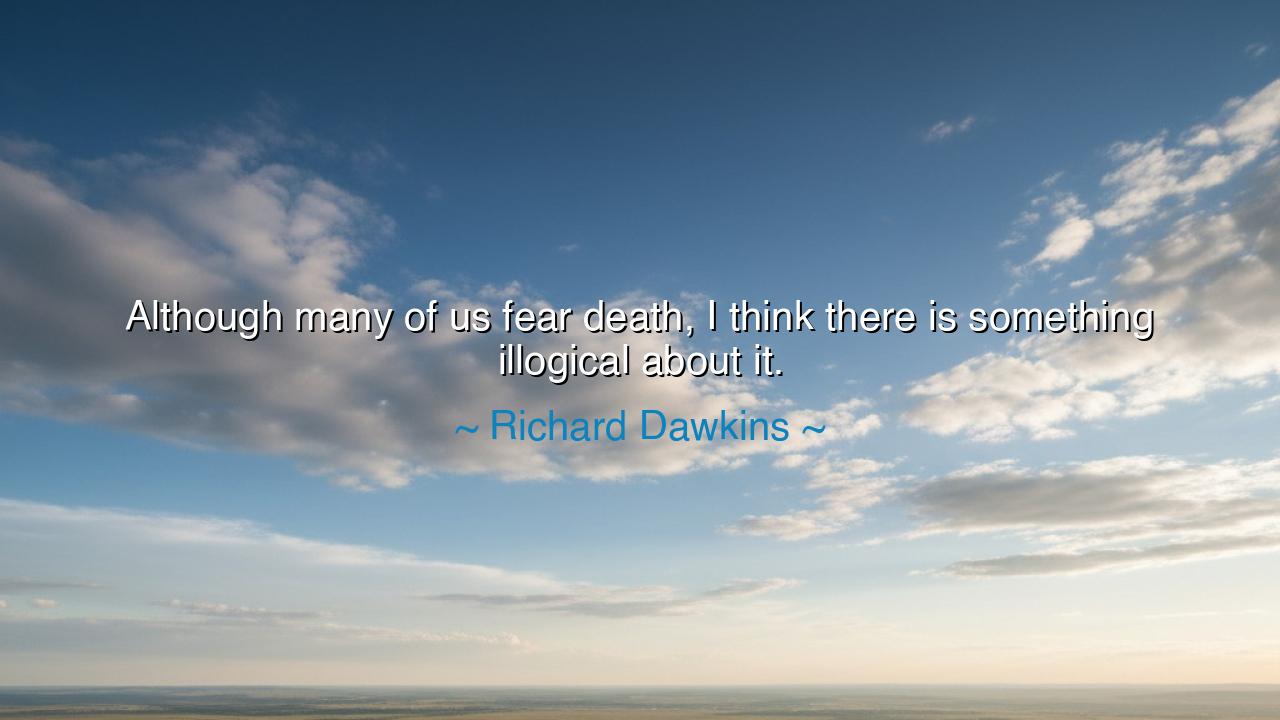
Although many of us fear death, I think there is something






“Although many of us fear death, I think there is something illogical about it.” Thus spoke Richard Dawkins, the biologist and philosopher of reason, whose voice has long sought to bridge the gap between the mysteries of nature and the understanding of man. In this reflection, he points to one of the oldest paradoxes of the human soul—that we tremble before the very thing that defines all life. For death, to Dawkins, is not a punishment, nor a tragedy; it is a simple fact of existence, woven into the same fabric as birth itself. His claim of illogic is not arrogance, but clarity—the recognition that fear, though natural, blinds us to truth. If we come from nothing and shall return to nothing, then what, truly, is there to dread in that eternal sleep?
The ancients wrestled with this same question beneath their stars and temples. The philosopher Epicurus, centuries before Dawkins, taught that fear of death is folly. “When we exist, death is not; and when death exists, we are not.” His meaning was simple yet profound: the two states—life and death—can never meet. Thus, to fear death is to fear a shadow that never touches us. Dawkins, speaking in a modern age yet echoing the ancients, calls this fear illogical because it arises not from reason but from imagination. We invent horror in the absence of experience. We dread a void that cannot harm us. Our fear, then, is not of death itself, but of leaving the story of life unfinished.
And yet, the fear of death is one of humanity’s oldest companions. It drives kings to build monuments, artists to carve their names into stone, and lovers to cling tighter in the night. In truth, it is not death we fear, but oblivion—the loss of meaning, of memory, of self. We are creatures of continuity, bound to time like sailors to the sea, terrified of its final wave. But Dawkins invites us to see life differently. He reminds us that the miracle is not in the avoidance of death, but in the rare privilege of existence itself. Out of the infinite possibilities that might have been nothing, we are. To fear the end, then, is to overlook the wonder of having begun at all.
Consider the story of Socrates, who, condemned to die, drank the hemlock without trembling. When his students wept, he rebuked them gently, saying that death was but a release—a passage to what comes next, or to nothing at all. “Why fear what you cannot know?” he asked. “Is the sleep of dreamless rest not peaceful?” In that moment, Socrates embodied the very truth Dawkins would later express: that to fear death is to defy reason itself. The wise man, like the scientist, meets death not with despair but with curiosity—with gratitude for the life already granted, and acceptance of the law that governs all things living.
In the natural world, which Dawkins has spent his life studying, death is not a failure but a function. Every organism, from the humblest microbe to the tallest tree, is part of a grand exchange—giving way so that others may rise. The leaves that fall nourish the roots beneath; the stars that burn out scatter the elements that will one day form new worlds. Death, seen through the eyes of nature, is not an ending but a transformation. To fear it, Dawkins implies, is to misunderstand the very rhythm of existence—to see only darkness where there is an eternal cycle of renewal.
Still, there is tenderness in his logic, for Dawkins does not mock those who fear death—he seeks to free them. To recognize the illogic of fear is not to deny emotion, but to elevate understanding. He reminds us that wisdom begins when we stop resisting the inevitable and start cherishing the improbable miracle that we live at all. The ancients called this phronesis, the wisdom of acceptance: to live fully within one’s fate, unburdened by illusions of immortality. When we understand that life is fleeting, every breath becomes sacred, every dawn a gift unearned.
So, my child, take this teaching into your heart: do not fear death, but learn from it. Let its presence remind you to live with urgency, but not panic—to love without restraint, to act with purpose, to see each moment as a spark in the vast night of time. When fear rises, remember Dawkins’s logic and Epicurus’s peace: that what you dread will never touch you, and that your existence, however brief, was a triumph over infinite silence. The body will fall, the stars will fade, but the fact that you once were—that consciousness burned even for a moment in the void—is the greatest wonder of all. Thus, live bravely, think clearly, and when your time comes, greet death not as an enemy, but as an old friend returning you to the stillness from which all life begins.






AAdministratorAdministrator
Welcome, honored guests. Please leave a comment, we will respond soon